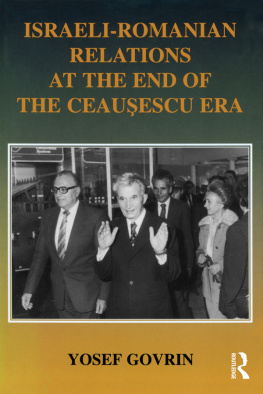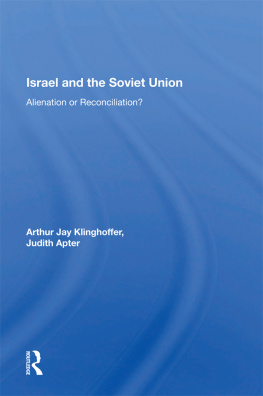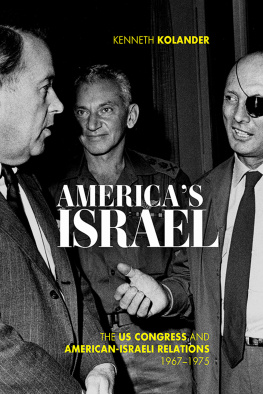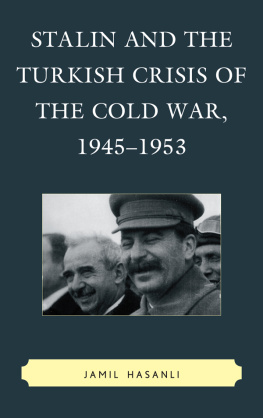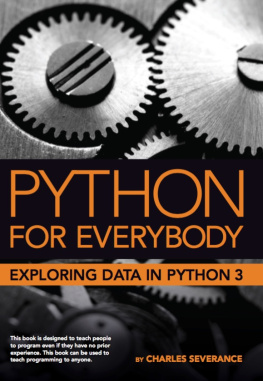First Published in Hebrew in 1990 by the Magnes Press,
Hebrew University of Jerusalem, Jerusalem
First English edition published by
FRANK CASS PUBLISHERS
This edition published 2013 by Routledge
711 Third Avenue, New York, NY 10017
2 Park Square, Milton Park, Abingdon, Oxon OX14 4RN
Routledge is an imprint of the Taylor & Francis Group, an informa business
Copyright 1998 Yosef Govrin
British Library Cataloguing in Publication Data:
Govrin, Yosef
Israeli-Soviet relations, 1953-67: from confrontation to
disruption
1. Israel - Foreign relations - Soviet Union 2. Soviet Union
- Foreign relations - Israel - 1953-1975
I. Title
327.5'694'047
ISBN 0-7146-4872-8 (cloth)
ISBN 0-7146-4427-7 (paper)
Library of Congress Cataloging-in-Publication Data:
Govrin, Yosef.
[Yahase Yira'el Berit-ha-Mo'atsot. English]
Israeli-Soviet relations, 1953-67: from confrontation to
disruption / Yosef Govrin. - 1st English ed.
p. cm.
Includes bibliographical references and index.
ISBN 0-7146-4872-8 (cloth). - ISBN 0-7146-4427-7 (pbk.)
1. Israel-Foreign relationsSoviet Union. 2. Soviet Union
Foreign relations-Israel. 3. Soviet Union-Foreign
relations-1953-1975. I. Title.
DS119.8.S65G6813 1998
327.5694047dc21 97-45497
CIP
All rights reserved. No part of this publication may be reproduced in any form or by any means, electronic, mechanical, photocopying, recording or otherwise, without the prior permission of the publishers.
Typeset by Vitaset, Paddock Wood, Kent
Dear Reader,
I was First Secretary of the Israeli Embassy in Moscow when the Soviet government informed the government of Israel, on Saturday 10 June 1967, of its decision to sever diplomatic and consular relations with Israel following the results of the Six Day War. This announcement was the culmination of Soviet political support - in addition to massive military support for the Arab countries in their fight against Israel.
That day at noontime I was walking from our residence at the Sadovo-Samotechnaya to the Embassy of Israel on Bolshaya Ordinka Street. It was a lovely sunny day. My heart was torn in two. On the one hand, I felt extremely happy to know that my country - Israel - had been able to defeat the Arab countries who had threatened, in so many declarations, to destroy us. On the other, I could only assume - at that stage that the victory of Israel's Defense Forces had been achieved at the very heavy price of many dear lives of young soldiers and officers, who were dreaming of living in their Homeland in peace and security, like any other normal people on this earth, their futures awaiting them, and now they had left behind deep pain and profound grief in the hearts of family and friends.
Walking through the central streets of Moscow I encountered many cars with loudspeakers informing the public of the Soviet breach of relations with Israel. For a moment it seemed as if the Soviet Union was declaring war against Israel. Indeed, from that moment on the Soviet Union stood completely at the side of Israel's enemies, on bilateral and international levels. In fact until then, between Israel and the USSR, there had never been a conflict, either territorial or military. On the contrary, historic social and cultural ties connected both nations. True, there were ideological differences - the Soviet Union fought against Zionism, with no reason, and rejected, categorically, Israel's pleas to let Jews living in the USSR emigrate to Israel. Yet, from that to the breach of diplomatic relations was a long distance. Moreover, the breach constituted an act which weakened the international system of relations rather than strengthening it.
Upon reaching the street where the Embassy stood, I could hardly make my way through. Hundreds, if not thousands, of workers, brought in from all the different enterprises in Moscow, blocked the entrance to the Embassy. They were carrying anti-Israeli slogans, shouting every few minutes 'Doloy [Down] with Israel'; the most humiliating slogan was the one comparing Israel to Nazi Germany.
I went up to the second floor of the building and, together with the rest of our staff, looked through the wide windows at the outrageous mob outside the gate. It was a frightful scene, as if they were going at any moment to penetrate into the courtyard and then into the building itself. It was hours before they left, but not before we were instructed several times by the Protocol of the Soviet Ministry of Foreign Affairs to pull down our flag. And we did so, at sun set, singing our national anthem, 'Hatikvah' ('The Hope').
On 18 June 1967 we locked the building (handing over the keys to the Dutch Embassy which represented our interests in the Soviet Union during the entire period of the breach in relations, 1967 1989) and left Moscow for home.
From then until now, nearly 30 years have passed. I served at various posts in the Foreign Ministry in Jerusalem and in our Foreign Service abroad. The last positions I held abroad were as Israel's Ambassador to Bucharest, during the Ceausescu era (Romania was the single country in the Communist bloc not to have severed its relations with Israel following the Six Day War), and lately as Israel's Ambassador to Austria and to the UN organizations in Vienna as well as non-resident Ambassador to Slovakia and Slovenia.
After my return from Bucharest, I was appointed Deputy Director General of the Ministry for East Europe. We were then engaged in the process of renewing our diplomatic relations with the east European countries. It was in this capacity that I returned for the first time to Moscow, in September 1990, as head of the Ministry's delegation, for talks held with officials of the Soviet Foreign Ministry in preparation for the renewal of Israeli-Soviet relations.
It was only natural that I returned to the premises of our Embassy building, where an Israeli consular delegation had been operating from 1989. Excitedly, I went up to the second floor to the same window looking out over Bolshaya Ordinka, where I had stood watching the mob outside who shouted humiliating slogans against Israel when the Six Day War ended. Now I saw through the window hundreds of men and women all along the street - just as then - but lining up quietly, waiting to get an entry visa to Israel, mostly for permanent residence.


